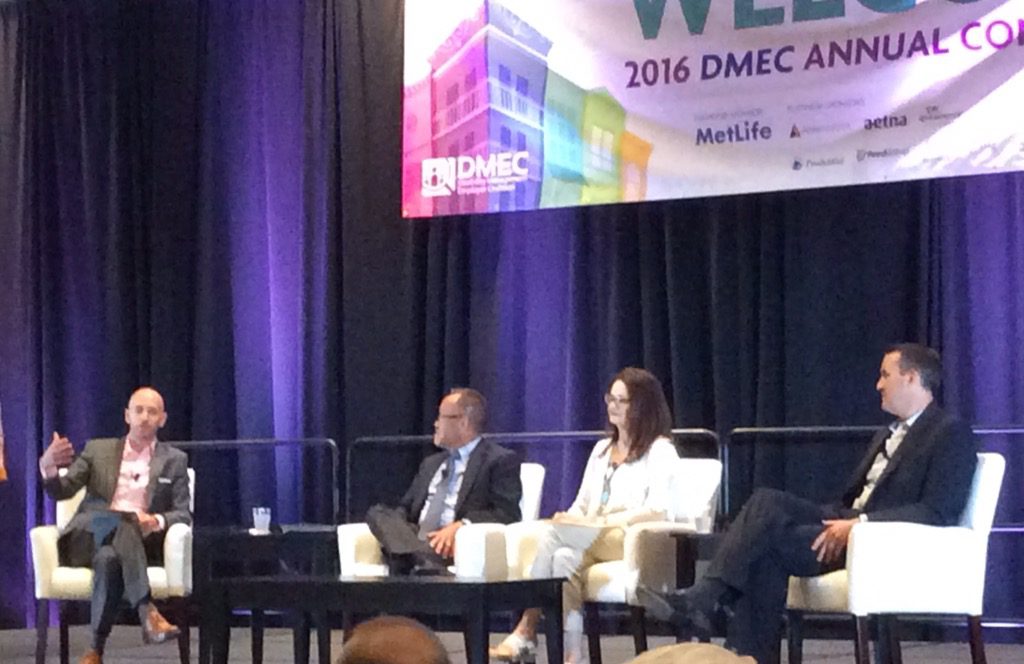Programs to Address Mental Health in the Workplace
At the 2016 DMEC Annual Conference, a panel discussed how organizations offering mental health solutions can improve the employee experience and engagement. The panel was:
- Scott Daniels – Director of Disability Benefits – Comcast
- Jack Stoddard – Chief Strategy Officer – Accolade, Inc.
- Hong Un – Chief Psychiatric Officer and Head of EAP – Aetna
- Adele Spallone – VP Business Integration & Strategies and Absence Management Services – Aetna
One overriding thing to keep in mind when creating a behavioral health wellness program is that there is no one-size-fits-all solution. Something that works for a large employer with many resources won’t work for smaller companies.
There are lots of questions about resilience and mindfulness when you talk about mental health solutions. Today people face so many more pressures than in the past. The cell phone keeps you connected to work all the time making it difficult for people to separate work from home. People are over scheduled with work and family activities. Finally, financial pressures are with us constantly. The human brain is not designed to handle constant stress. It needs occasional breaks to rest and recover. Resilience is a way for people to come out of a stressful situation stronger than before. Mindfulness involves living in the present moment and disassociating thinking from feelings so that you can react appropriately based on facts instead of feelings. Tools to help us develop resilience and mindfulness can help us reduce stress.
One of the big challenges with a behavioral health wellness program is achieving employee engagement. This starts with culture. Is your workplace culture open to supporting wellness programs and are such efforts supported from the top and through the management ranks? Your workforce also needs to understand “what’s in it for them” so they will engage with the behavioral health wellness program.
Unfortunately, many disability insurance carriers deny requests for disability caused by workplace stress. At the same time workers’ compensation does not respond to cover such instances. In many states, routine stress from the workplace does not create a compensable workers’ compensation claim. This creates a gap in coverage that must be addressed.
Advocacy is an important element for any behavioral health program. Employees need someone to assist them in navigating the complexity of their employee benefits and the healthcare system. If you provide an advocate for your employees, they will have better results and significantly higher satisfaction.
There has been a lot of attention lately on identifying physical co-morbidities that can impact medical outcomes such as high blood pressure, obesity or diabetes. This same level of attention needs to be given to identifying behavioral health co-morbidities. For example, if one person in a family is dealing with significant mental health issues, that can have a significant impact on others in the household.
Some key takeaways from the panel included:
- The importance of integrating your vendors. You need to fully take advantage of all the resources that are available to you through your benefits program. This includes focusing on getting the employee the treatment they need first and then dealing with whether this should be covered by workers’ compensation or group health.
- Most mental health disorders are preventable and very treatable. Mindfulness can assist us in responding appropriately to a situation so that it does not create stress.
- Everyone should do a self assessment on the biases they have on mental health issues and what they can personally do to overcome those biases.
- If you view employee benefits from the consumer side instead of the payer side, it will give you a very different perspective on things. The complexity of employee benefits and the healthcare system is extremely frustrating to consumers.
- Don’t be afraid to try pilot programs to see what impact they will make. You cannot change the results without changing your approach and that all starts with being willing to do something different.


